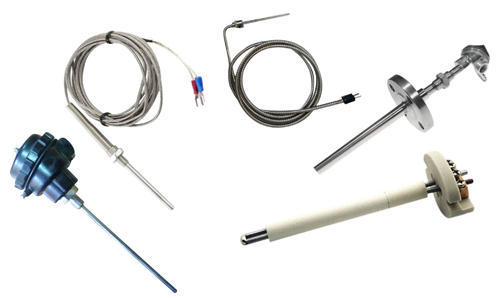
Thermocouples
Thermocouples
We manufactures a wide selection of industrial process thermocouples to meet the requirements of the most demanding process applications in the world such as steel processing, turbine and diesel engine temperature measurement, and chemical processing. In addition, We also manufactures thermocouples that are built for commercial applications such as for foodservice, packaging, and semiconductor processing. We can assist you with custom designed process thermocouples for your application.
Design Features
- Various connection and mounting styles available
- Extreme high-temperature ranges
- Utilized in heavy duty industrial applications
- Ideal for limited space requirements
Typical Applications
- Steel Processing
- Turbine and Diesel Engine
- Temperature Measurement
- Chemical Processing
- Food Services
- Packaging
- Semiconductor Processing
Types of Thermocouple
K-Type Thermocouple
The type K is the most common type of thermocouple. It's inexpensive, accurate, reliable, and has a wide temperature range. The type K is commonly found in nuclear applications because of its relative radiation hardness. Maximum continuous temperature is around 1,100C.
Type K Temperature Range
- Thermocouple grade wire, -454 to 2,300F (-270 to 1260C)
- Extension wire, 32 to 392F (0 to 200C)
Type K Accuracy (whichever is greater)
- Standard: +/- 2.2C or +/- .75%
- Special Limits of Error: +/- 1.1C or 0.4%
J-Type Thermocouple
The type J is very common. It has a smaller temperature range and a shorter lifespan at higher temperatures than the Type K. It is equivalent to the Type K in terms of expense and reliability.
Type J Temperature Range
- Thermocouple grade wire, -346 to 1,400F (-210 to 760C)
- Extension wire, 32 to 392F (0 to 200C)
Type J Accuracy (whichever is greater)
- Standard: +/- 2.2C or +/- .75%
- Special Limits of Error: +/- 1.1C or 0.4%
Resistance Temperature Detectors (RTD)
Resistance Temperature Detectors (RTDs) are temperature sensors that contain a resistor that changes resistance value as its temperature changes. They have been used for many years to measure temperature in laboratory and industrial processes, and have developed a reputation for accuracy, repeatability, and stability.
RTDs offer several advantages
- A wide temperature range (approximately -200 to 850 C)
- Good accuracy (better than thermocouples)
- Good interchangeability
- Long-term stability with a temperature range up to 850 C, RTDs can be used in all but the highest-temperature industrial processes.
